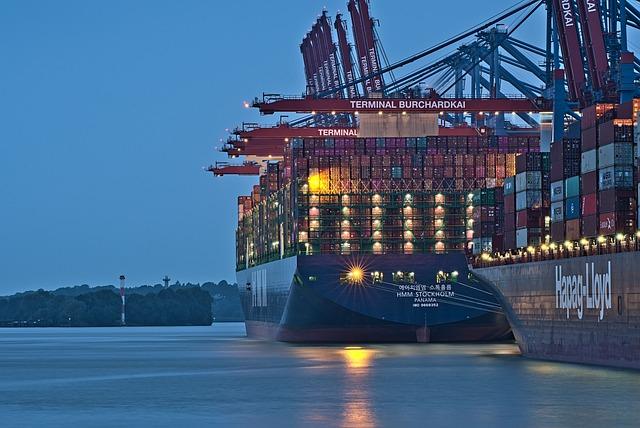In an increasingly interconnected global landscape, nations are continually exploring strategies to elevate their economic standing and ensure sustainable growth. Pakistan, endowed with rich resources, a vibrant population, and strategic geographical positioning, stands at the precipice of transformation. As the country navigates complex economic challenges, the need for innovative trade strategies has never been more pressing. This article delves into the myriad ways that Pakistan can harness creativity and ingenuity in trade practices to not only boost its economic performance but also foster resilience in an ever-evolving market. By examining successful case studies, potential partnerships, and emerging global trends, we aim to illuminate a path forward for Pakistan—one that embraces innovation while respecting the rich traditions that shape its economic landscape. Join us as we explore the promising avenues that could redefine trade and catalyze prosperity for the nation.
Catalyzing Economic Expansion through Sustainable Export Promotion
In the dynamic landscape of global trade, fostering sustainable export promotion has emerged as a pivotal strategy for driving economic growth. By investing in green technologies and environmentally friendly practices, Pakistan can unlock new markets and enhance its competitive edge. This transformative approach allows local businesses to not only reduce their carbon footprint but also to appeal to increasingly eco-conscious consumers worldwide. To achieve this, a collaborative framework involving government support, private sector engagement, and community participation is essential. Key initiatives could include:
- Incentives for Green Production: Offering tax rebates or subsidies for companies adopting sustainable practices.
- Training Programs: Implementing workshops to educate exporters on sustainable practices and compliance with international standards.
- Market Research: Conducting studies to identify trends in sustainable goods and pinpoint lucrative export opportunities.
- Partnerships with NGOs: Collaborating with organizations focused on sustainability to leverage resources and expertise.
Additionally, creating a dedicated export promotion body focused on sustainability can streamline efforts to enhance supply chain transparency and facilitate easier access to international markets for small and medium enterprises (SMEs). A clear strategy with measurable targets will help establish a strong foundation for sustainable exports that can propel economic growth. The following table illustrates a simple breakdown of potential sectors with existing sustainable practices and their corresponding export potential:
| Sector | Sustainable Practice | Export Potential (in millions USD) |
|---|---|---|
| Textiles | Organic fibers | 150 |
| Agri-products | Eco-friendly farming | 100 |
| Handicrafts | Recyclable materials | 50 |
| Renewable Energy | Solar panel exports | 200 |

Harnessing Digital Platforms for Modernizing Trade Mechanisms
The evolution of trade mechanisms in the digital age presents Pakistan with unprecedented opportunities to modernize its economic infrastructure. By leveraging digital platforms, the country can streamline its trade processes, enhance transparency, and reduce transaction costs. The integration of technologies such as blockchain and artificial intelligence not only aids in better tracking of goods and payments but also fosters trust among trading partners. Key initiatives can include:
- Implementation of E-Commerce Regulations: Establishing frameworks to support online marketplaces and small businesses.
- Digital Payment Solutions: Promoting the use of secure, instant payment systems to facilitate cross-border transactions.
- Data Analytics: Utilizing AI-driven insights to optimize supply chain management and demand forecasting.
Moreover, partnerships between the public and private sectors will be crucial for harnessing these digital innovations. By investing in infrastructure such as high-speed internet and digital literacy programs, Pakistan can create a robust ecosystem that supports e-commerce and digital trading platforms. This collaborative approach can significantly enhance the competitiveness of local businesses in the global market. A potential roadmap can look like this:
| Key Focus Areas | Expected Outcomes |
|---|---|
| Regulatory Frameworks | Enhanced business environment and investor confidence |
| Technology Adoption | Increased efficiency in trade processes |
| Skill Development | More skilled workforce in digital commerce |

Fostering Public-Private Partnerships to Enhance Supply Chain Efficiency
Emphasizing the importance of collaboration between the government and the private sector can greatly improve Pakistan’s supply chain ecosystem. By creating strategic alliances, stakeholders can share resources, knowledge, and technology, leading to smarter, more efficient logistics. In particular, these partnerships can focus on:
- Infrastructure Development: Enhancing transportation networks to facilitate quicker movement of goods.
- Digital Innovation: Utilizing modern software solutions to streamline inventory management and reduce lead times.
- Training and Skills Development: Investing in workforce development programs to meet the demands of evolving supply chain needs.
Leveraging public-private partnerships not only addresses immediate logistical challenges but also positions Pakistan for sustainable economic growth. Collaborative approaches can lead to the establishment of innovation hubs, where businesses can pilot new technologies and practices. Furthermore, through joint initiatives, entities can engage in market analysis and share insights that drive better decision-making. Below is a table showcasing some potential areas of collaboration:
| Collaboration Area | Potential Benefits |
|---|---|
| Logistics Management | Reduced transportation costs and improved delivery times. |
| Environmental Sustainability | Adoption of eco-friendly practices and technologies. |
| Market Access | Expanded opportunities for local businesses in global markets. |

Diversifying Trade Relationships for Resilient Economic Integration
In an ever-evolving global marketplace, it’s crucial for countries like Pakistan to broaden their trade connections to stimulate economic resilience. By forging new partnerships and strengthening existing ones, Pakistan can tap into diverse markets that alleviate the risks associated with dependency on a limited number of trade relationships. This strategic approach involves identifying potential trade partners across different regions, including Europe, Southeast Asia, and the Middle East. Such diversification can lead to increased export opportunities and the acquisition of resources and technologies that can propel various sectors within Pakistan’s economy.
To further enhance these trade relationships, a focus on innovative strategies is essential. This may include:
- Leveraging Technology: Utilizing digital platforms for trade facilitation and e-commerce to reach wider audiences.
- Improving Trade Infrastructure: Upgrading ports and logistics to enhance the efficiency of goods movement.
- Establishing Trade Agreements: Negotiating bilateral and multilateral agreements that encourage trade and investment.
- Encouraging Export Development: Supporting local businesses to explore foreign markets through training and access to exporting resources.
Implementing these strategies not only supports economic growth but also builds resilience against global fluctuations. The table below highlights potential trade partners for Pakistan, illustrating their significance:
| Country/Region | Potential Trade Opportunities | Key Exports |
|---|---|---|
| China | Manufactured goods, electronics | Textiles, agricultural products |
| European Union | Pharmaceuticals, automotive | Sports goods, fruits |
| Middle East | Energy, construction | Textiles, leather goods |
| Southeast Asia | Agricultural products, tourism | Rice, seafood |
In Retrospect
Pakistan stands at a pivotal juncture where its economic potential can be unlocked through innovative trade strategies that not only enhance domestic growth but also position the country as a competitive player on the global stage. By embracing technology, fostering partnerships, and diversifying its markets, Pakistan can navigate the complexities of modern trade dynamics. The adoption of forward-thinking policies and practices can stimulate entrepreneurship, attract foreign investment, and ultimately drive sustainable economic development. As stakeholders across the spectrum—governments, businesses, and individuals—align their efforts towards these ambitious strategies, the vision of a prosperous Pakistan powered by trade innovation can become a tangible reality. With each step taken toward this goal, we pave the way for a brighter, more resilient future for generations to come.



